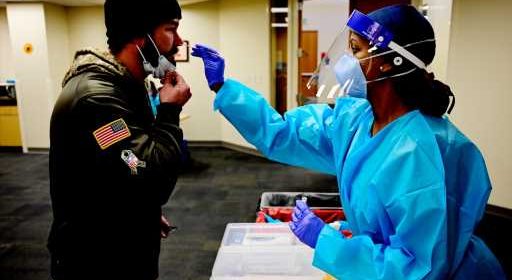How to get tested for COVID in Denver after some free sites close

As COVID-19 cases rise again in Colorado, the state is shutting down more than a dozen free testing sites across metro Denver by April 30.
That’s the bad news. The good news: Several options still remain to get tested through a lab at no cost — though there are more choices for people with health insurance than for those who lack insurance. And you may have to travel a little farther.
In announcing the closure of 40 of the state’s 120 testing sites earlier this month, including 16 in metro Denver, the Colorado Department of Public Health and Environment said it was transitioning from offering testing and vaccination at state-run sites to leaning more on “traditional health care settings.” It said the 80 remaining state sites still would have capacity to handle 26,000 tests per day, with additional capacity available through health care providers, private pharmacies and other testing centers.
But as cases have risen, demand for testing has increased from about 2,500 tests per day early in the month to an average of 12,000 more recently. That’s well below the peak of 60,000 or more daily tests back in January, at the height of the omicron wave.
At the same time, more people are relying on at-home rapid antigen tests that typically don’t get reported to the state.
“We’re in a very different place in the pandemic now than we’ve been at any other time,” said Scott Bookman, the state’s COVID-19 incident commander. “Demand for testing has gone down significantly. We’re only using about 5% of our capacity at our statewide testing sites.”
How to get a COVID test
PCR tests and other lab tests typically provide results in one to two days and are more accurate at detecting COVID than rapid antigen tests. If you need one, here are the options available:
- State sites: The remaining public testing sites include many in Denver and the suburbs, with some open only on weekdays and some with weekend hours. Visit covid19.colorado.gov/testing to find the nearest test site. Among those closing at the end of this week are sites downtown at the Auraria Campus and on the 16th Street Mall.
- Health care providers: People with insurance typically can obtain free testing at doctor’s offices and other facilities, and insurers such as Kaiser Permanente Colorado also are covering off-site tests or reimbursing members for the cost. Private insurers also must provide reimbursement for at-home rapid tests.
- Pharmacies: Pharmacy chains, including Walgreens and CVS, also offer on-site testing, billing insurance for those with coverage and using a federal program to cover the cost for uninsured people. Appointments are available on their websites. Though funding for the uninsured program has run out while Congress debates a new COVID spending bill, the two chains have said they are still waiving charges.
- Private testing: Testing centers and urgent-care clinics across the metro area offer tests that are covered by some insurance plans or can be purchased out of pocket. Costs for a PCR or NAAT test typically run $125 to $200, with expedited results available at some centers for an extra charge. For travelers, Denver International Airport has two XpresCheck locations, in the terminal and on Concourse B, that charge $175 for a standard PCR test and $250 for a rapid PCR test that returns results within an hour.
The new federal “Test to Treat” program offers another free option that connects people to pharmacies and clinics that can provide quick tests and, if necessary, free prescription antiviral medication to treat COVID. You also can bring a result from an at-home rapid test or a test taken elsewhere to receive a free assessment for medications.
An online portal for the program shows 10 participating locations within 30 miles of downtown Denver, most of them inside King Soopers grocery stores. Information about participating locations is also available by calling 800-232-0233.
What about at-home rapid tests?
Several local governments and community organizations offer supplies of free at-home rapid tests, which provide results in about 15 minutes. The federal government also is still offering each household two sets of four rapid tests, available through special.usps.com/testkits.
“We’re in a different world,” Bookman said, with at-home tests offering convenient options for regular monitoring or quick access to a test following exposure to someone with COVID-19.
“At this point,” he said, “the test that you have availability and access to is the best test we have. Whether it’s a rapid test at home, a test at your provider (or) through the Test to Treat program, what we want to make sure is that about three days after exposure — or if you’re feeling symptomatic — get tested.”
If you test positive, Bookman said, “it’s absolutely critical that you reach out to your health care provider” to find out if you’re eligible for antiviral medications, such as Paxlovid or Lagevrio, since those require quick treatment to be effective.
Beyond testing, he said the best precaution remains getting vaccinated against COVID-19 and keeping up on boosters. The vaccines have been shown to reduce the chance of infection as well as the chance of developing severe disease if an infection occurs.
Source: Read Full Article